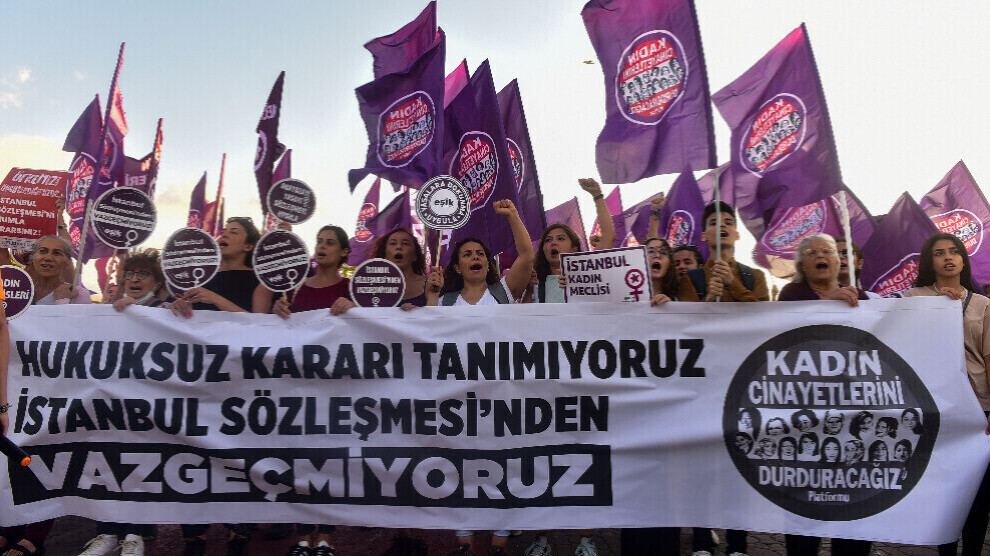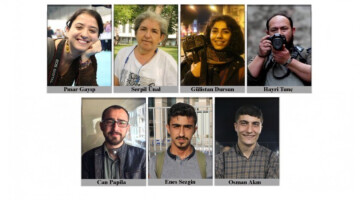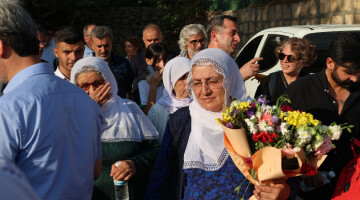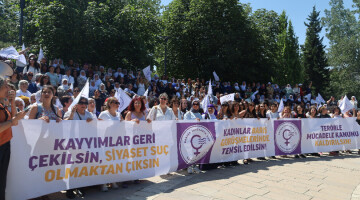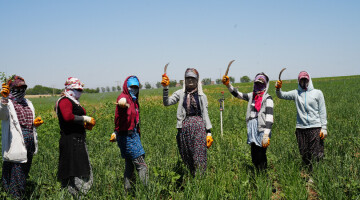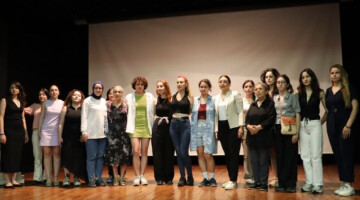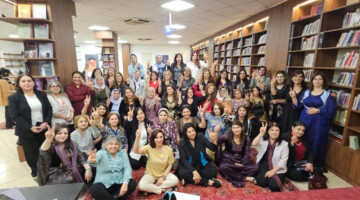United Nations (UN) Rapporteurs sent an expert opinion to the State Council of Turkey regarding the latter's withdrawal from the Istanbul Convention.
Undersigned by Reem Alsalem, Special Rapporteur on violence against women and girls, its causes and consequences (SRVAW); Melissa Upreti, Chair-Rapporteur of the Working Group on discrimination against women and girls (WGDAW), and Gladys Acosta Vargas, Chairperson UN Committee on the Elimination of Discrimination Against Women (CEDAW), the expert opinion recalled that Turkey was the first country to both sign (on 11 May 2011) and ratify (on 14 May 2012) the Istanbul Convention - the only international agreement that explicitly defines violence against women and provides a comprehensive framework for preventing violence against women, including domestic violence.
The Convention on the Elimination of All Forms of Discrimination Against Women (CEDAW) is another important source of international human rights obligations on gender equality and the elimination of gender-based violence against women and girls, to which Turkey acceded on 20 December 1985. According to Article 2 of CEDAW, Turkey has the core obligation to condemn discrimination of women in all its forms and “to pursue by all appropriate means and without delay” a policy of eliminating discrimination against women, by taking inter alia “all appropriate measures, including legislation, to modify or abolish existing laws, regulations, customs and practices which constitute discrimination against women”.
It should be noted that Turkey has made important strides in improving its national legislative and policy frameworks to address discrimination against women and to prevent and respond to violence against women and girls. It is our firm belief that the international human rights legal framework, to which Turkey is a signatory and State party (including CEDAW, the European Convention on Human Rights and the Istanbul Convention), have provided Turkey with the necessary tools on which to base the development of domestic laws and mechanisms, that are compatible with, and give effect to, international human rights obligations on gender equality. The positive impact that the Istanbul Convention has had on the human rights framework of the country cannot be overstated.
We believe that the specific and comprehensive nature of the Istanbul Convention, as well as its monitoring mechanism, are some of the reasons that have allowed Turkey to progress in the way it has, as any advances and challenges that States parties to the Istanbul Convention make are monitored and evaluated in an objective manner by the GREVIO secretariat. While these advances have been important, as the findings by GREVIO, the CEDAW Committee, and the UN Special Rapporteur on violence against women demonstrate, challenges remain.
The report stated, “In March 2021, we noted our dismay that political actors in Turkey had expressed concerns that the Istanbul Convention “threatened the family”, in a misinterpretation of the term gender, used in the Convention. On the contrary, we explained that the Convention provides Member States with tools to better protect women and girls and their human rights. We are, therefore, deeply concerned that Turkey’s withdrawal from the Istanbul Convention would have served to weaken its resolve as a State, and as a society, in its fight against discrimination and violence against women and girls, rolling back the gains that the country has made towards ensuring equality and nondiscrimination for everyone, including women and girls.
“In this respect, we consider it profoundly regrettable that the Government of Turkey did not intervene earlier in order to prevent the growing campaigns of disinformation surrounding the Istanbul Convention and that there have been no subsequent efforts to sufficiently explain the impact it has had on Turkey’s national legislation. This allowed some groups to misinterpret the objective and scope of the Convention as incompatible with Turkish social and family values. These groups have given a wrong interpretation of the term’s “gender”7 and “gender-based violence”. The Istanbul Convention follows the internationally agreed definitions for these terms, which are included in other international treaties and human rights documents on violence against women. In its article 4, the Istanbul Convention calls on parties to the Convention to implement it without discrimination on any ground, including gender. It does not promulgate or advocate for any particular gender ideology or sexual orientation. The duty not to discriminate on any grounds is a fundamental principle of human rights law and is enshrined in many of the treaties that Turkey is party to, including CEDAW as well as its own Constitution.”
Turkey continues to treat the issues of violence against women and children under the broader umbrella of the “family” and as part of the “protection of the family”, the report noted. During her official visit to Turkey in July 2022, the Special Rapporteur on violence against women and girls expressed her concern regarding this approach, as it undermines the effective identification of the risks of violence that women and children face as individuals, including within their own families.
“Furthermore, and in the course of the afore-mentioned visit, the Special Rapporteur on violence against women and girls, heard multiple accounts of how perpetrators of violence, particularly intimate partner violence, felt emboldened by the withdrawal from the Istanbul Convention, believing that they would no longer be held accountable for their crimes. Similarly, those members of law enforcement bodies and the judiciary, who hold pre-conceived gender biases, now rely on the withdrawal as legitimizing their tendencies not to investigate and prosecute acts of violence or threats of violence against women and girls. We have also received reports that the withdrawal from the Istanbul Convention may have created confusion among some stakeholders as to the legality and continued applicability of key provisions within the country’s domestic Law to Protect Family and Prevent Violence against Woman (Law 6284). Since Law 6284 is based on the Istanbul Convention its impact will be limited, if not all of its provisions are applied. Combined with the withdrawal of Turkey from the Istanbul Convention, this may serve to raise the levels of impunity for gender-based violence to alarming new levels,” the report said.
As the CEDAW Committee stated in its Concluding Observations on the eighth periodic report of the Republic of Turkey of July 2022, withdrawal from the Istanbul Convention is not only “a retrogressive measure that reduces the scope of protection of women’s human rights” but it is also “inconsistent with the State party’s due diligence obligations under the Convention on the Elimination of All Forms of Discrimination against Women to uphold women’s and girls’ highest human rights standards”. Namely, the Committee recalls “the principle of indivisibility and universality of human rights enshrined in the Vienna Declaration and Programme of Action of 1993, and anchored in the Convention, the Committee invites the State party to reconsider its decision to withdraw from the Istanbul Convention, which further weakens protections for women and girls, deprives them of acquired rights and stands in contrast to the aforementioned standards and principles of international human rights law”.
“More concerning to us is the fact that the withdrawal from the Istanbul Convention serves to potentially threaten Turkey’s implementation of CEDAW and adherence to other fundamental treaties and obligations that govern the protection of women and girls such as the Council of Europe’s Convention on the Protection of Children against Sexual Exploitation and Sexual Abuse (Lanzarote Convention), under the same pretext that they promote values that are incompatible with Turkish society,” the UN rapporteurs stated.
Further highlights from the report included:
“As the dialogue with the CEDAW Committee has demonstrated, along with the preliminary findings of the country visit that was recently carried out by the UN Special Rapporteur on violence against women and girls to Turkey, the country continues to grapple with serious and multiple manifestations of violence against women and girls, whose intersecting and multiple causes continue to persist and proliferate, including but not limited to: entrenched patriarchal stereotypes concerning the roles of women and men in society; the lack of effective prevention and protection measures for women and girls at risk of, or experiencing domestic violence; the worrisome phenomena of forced and early marriage; the underreported but serious problem of trafficking of women and girls for multiple purposes, including for sexual exploitation and abuse; the violence that women belonging to specific minorities experience, such as women in politics, LGBTI women, and women in prisons; and the significant barriers that many women experience in accessing services and support including Kurdish speaking women, migrant and refugee women – amongst others.
Furthermore, and despite the fact that adequate data on the level of violence is lacking, including on the rates of femicide or gender-related killings, available data show preoccupying levels of gender-based violence. According to government sources, at least 3,175 femicides have been reported in Turkey between 2010 and 2020 and more than 300 women were murdered in 2021, mostly by their intimate or former intimate partners or husbands or members of their families. The actual numbers are estimated to be much higher, as there is widespread underreporting.”
In that regard, the CEDAW Committee “recommends that the State party enhance mechanisms to monitor the enforcement of laws criminalizing gender-based violence against women by adopting “the necessary legislative amendments to specifically criminalize domestic violence and femicide” The Committee also urges the State party to act with priority in its efforts to prosecute and punish adequately all crimes committed in the name of so-called ‘honour’, “ensure that suicides, accidents and other violent deaths of women and girls are effectively investigated”. Specifically, it calls on the State party to “review its strategies to ensure that all COVID-19 recovery efforts, including emergency measures, are aimed at effectively preventing gender-based violence against women and girls”, among others.
The signatories of the present expert opinion reiterate the need for ensuring freedom of expression and of the legitimate activities for women human rights defenders, including for advocating against femicide and so called “honour crimes”, in favour of the Istanbul Convention and against the withdrawal from the Convention. The CEDAW Committee’s recommendation in this direction requires priority steps for its implementation.
The above-mentioned areas raise serious concern and the implementation of the relevant recommendations for action by the Government of Turkey are closely connected with the guarantees for women’s rights provided for by the Istanbul Convention.
Finally, we wish to note that since it is the Turkish parliament that ratified the Istanbul Convention, we would have expected the withdrawal to have been brought about by a decision of the same parliament. While this is an internal matter for Turkish democracy to resolve, we wish to express our regret that no wider parliamentary debate or consultation with civil society and other stakeholders have taken place ahead of the withdrawal.
It is not too late for Turkey to turn the tide and to be on the right side of history. As the Special Rapporteur on violence against women and girls stated upon wrapping up her visit to Turkey that “in many ways, Turkey is at an important junction in its history. It can either consciously and deliberately choose to protect the gains made in advancing the rights of women and girls, or risk backtracking on this important progress and leaving its women and girls behind.”
We would therefore urge the Council of State to carefully review and reconsider its first instance decision that upheld Decision No. 3718 of the President of the Republic and paved the way for Turkey’s early return as a signatory of the Istanbul Convention.”

